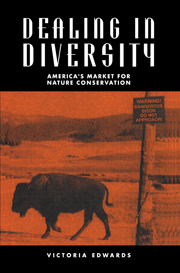Book contents
- Frontmatter
- Contents
- Preface
- Acknowledgments
- 1 Introduction: private provision of conservation
- 2 The conservation market
- 3 Collective action
- 4 Protection mechanisms and incentives
- 5 Fee-hunting
- 6 Watchable wildlife
- 7 Turning development into conservation
- 8 Conservation partners
- 9 Towards a more holistic approach
- References
- Index
2 - The conservation market
Published online by Cambridge University Press: 19 January 2010
- Frontmatter
- Contents
- Preface
- Acknowledgments
- 1 Introduction: private provision of conservation
- 2 The conservation market
- 3 Collective action
- 4 Protection mechanisms and incentives
- 5 Fee-hunting
- 6 Watchable wildlife
- 7 Turning development into conservation
- 8 Conservation partners
- 9 Towards a more holistic approach
- References
- Index
Summary
Conservation is paved with good intentions which prove to be futile, or even dangerous, because they are devoid of critical understanding either of the land, or of economic land-use.
Aldo Leopold (The Land Ethic)Economic theory and private landowners
Many private landowners have on their property important wildlife habitat that they may wish to protect, such as wetlands, forests, rivers or lakes. For much of the recent past, wildlife habitat on private (and public) land has been destroyed or altered globally, as landowners have sought to exploit the benefits to be gained from managing the land for other uses. Such uses could include agriculture, forestry, construction or industrial use (such as landfill or waste disposal). The private landowner must make a choice regarding the future use of an area; protection of special features provides only one option. In assessing how to manage the land, the private landowner will take into account the costs and benefits of protecting and enhancing the wildlife habitat against the costs and benefits of alternative land uses.
Today, it is widely recognized that wildlife habitats are valuable resources when conserved and managed in their natural state. How can we, as a society, exercise our choice over the future use of such private areas in the interests of the wildlife resource? Economic theory is concerned with such choices and the allocation of scarce resources between competing objectives.
- Type
- Chapter
- Information
- Dealing in DiversityAmerica's Market for Nature Conservation, pp. 13 - 37Publisher: Cambridge University PressPrint publication year: 1995



